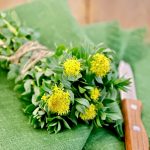Arctic herb linked to IMPROVED quality of life, especially for people feeling emotionally upset
 (NaturalHealth365) For centuries, natural practitioners have relied on Rhodiola rosea to stop depression, treat age-related cognitive decline, promote overall wellbeing and boost physical performance. Now, emerging data links this ancient herb with the ability to prolong life.
(NaturalHealth365) For centuries, natural practitioners have relied on Rhodiola rosea to stop depression, treat age-related cognitive decline, promote overall wellbeing and boost physical performance. Now, emerging data links this ancient herb with the ability to prolong life.
Rhodiola also called golden root or arctic root grows in the mountainous areas of Asia and Europe. The medicinal use of rhodiola root, which has a characteristic fragrance of roses, has been documented as early as the first century A.D. In fact, rhodiola has been traditionally used in Russian folk medicine to treat stress, hysteria, and headaches; in the ancient Indian healing system known as Ayurveda, rhodiola is treasured as a rasayana, or “royal” herb capable of extending life.
Multifaceted herbal solution reduces stress-related fatigue
Like ginseng, another adaptogenic herb, rhodiola boosts the immune system, combats depression and fatigue, and helps the body deal with stress. Animal and test-tube studies have supported the power of rhodiola, as an antioxidant, to decrease the creation of free radicals – which helps to prevent serious health conditions like, cancer and heart disease.
Rhodiola’s therapeutic powers – which have been known to natural healers for close to two thousand years — are currently impressing conventional Western-trained scientists. Even the anti-natural healing advocates at Memorial Sloan-Kettering Cancer Center credit rhodiola with neuroprotective, antidepressant, and antioxidant effects, and confirms that the herb can improve physical and mental performance while reducing stress-related fatigue.
Interestingly, the effects of this useful herb can vary by the amount you take. While low amounts appear to stimulate mental clarity and promote vitality – by improving blood flow to the brain and stimulating the serotonin, norepinephrine, and dopamine systems – higher amounts have a mildly sedating effect.
Recent studies confirm rhodiola has potent life-extending properties
In a study published in 2013 in the medical journal PLOS One, researchers found that rhodiola increased the lifespan of Drosophilia fruit flies by a dramatic 24 percent. Drosophila fruit flies are a common subject of laboratory study, due to both their abbreviated life spans and the number of genes they share in common with humans. Although this result may seem at first glance to have little relevance to human longevity, knowing how rhodiola helps prolong life can help scientists glean valuable insight into ways in which the herb can help treat and prevent age-related health issues and degenerative diseases.
Making the study results even more significant is the fact that rhodiola produced its results by an unusual mechanism that was unrelated to dietary restriction, the usual method of increasing life span in studies.
Dietary restriction prolongs life — up until the point that diet is so severely restricted that malnutrition becomes an issue. Contrary to all expectations, rhodiola prolonged life even when the severely decreased nutrients should have shortened it, and even helped extend the lives of flies that were already elderly. These promising results led researchers to conclude that rhodiola is a viable candidate to treat aging and age-related disease in humans.
Like so many other life-prolonging herbs, rhodiola is rich in antioxidants.
In addition to rhodiola’s primary active constituents – phytochemicals known as rosavin, rosarin, and salidroside – the roots are also packed with flavonoids, catechins, and proanthocyanidins – the same healthful plant pigments found in acknowledged ‘superfoods’ such as blueberries and cherries. Beta-sitosterol, a natural anti-inflammatory substance, is found in rhodiola as well, as well as beneficial gallic acid, which is also a constituent of life-prolonging green tea.
How effective is rhodiola in helping people with depression?
In a double-blind, randomized 6-week study published in 2007 in Nordic Journal of Psychiatry, patients with mild to moderate depression who were given rhodiola experienced a substantial reduction in symptoms of depression and insomnia, as assessed on day 42 with the use of the Hamilton Depression Scale and the Beck Depression Inventory.
Patients who received a placebo rather than rhodiola reported no improvement whatsoever. Plus, no serious side effects were reported in the rhodiola group.
How much rhodiola should I take?
Rhodiola, standardized to contain 3 percent rosavin and 1 to 2 percent salidroside, is available in capsule and tablet form at health food stores and online. The usual amount is 200 to 600 milligrams per day.
Rhodiola is generally considered safe, but you shouldn’t use it to treat depression – or any other condition – unless under the guidance of a qualified medical professional – well trained in herbalism. It can interact with prescription drugs and other supplements; so consult your doctor before taking rhodiola – especially if you also take psychotropic medications or have diabetes or a thyroid condition.
This sweet-smelling, rose-scented arctic root – which is currently being studied for possible applications in treating Alzheimer’s disease and cancer – may hold a sweet promise indeed: the potential for extending human life.
Sources for this article:



